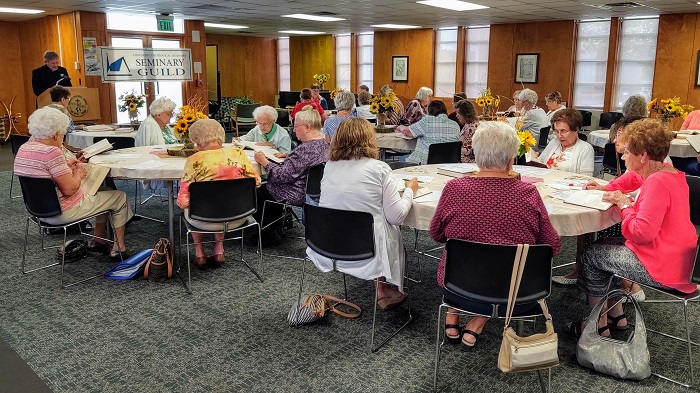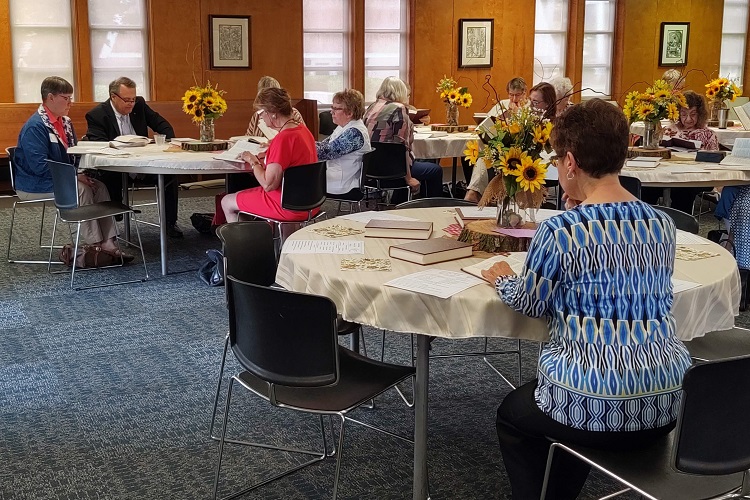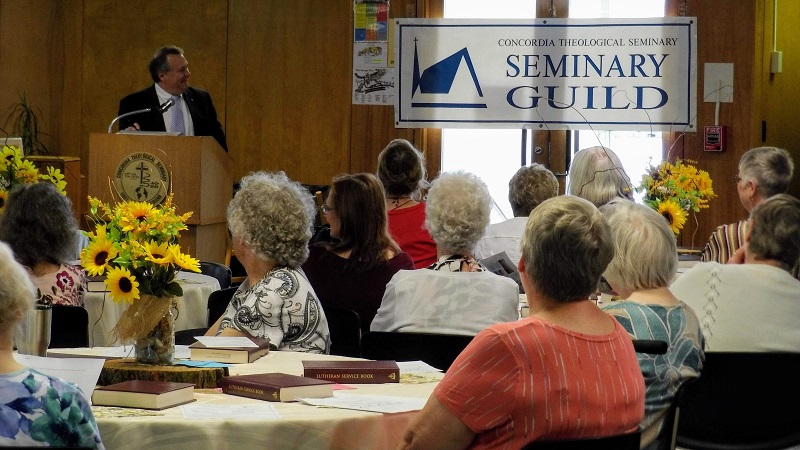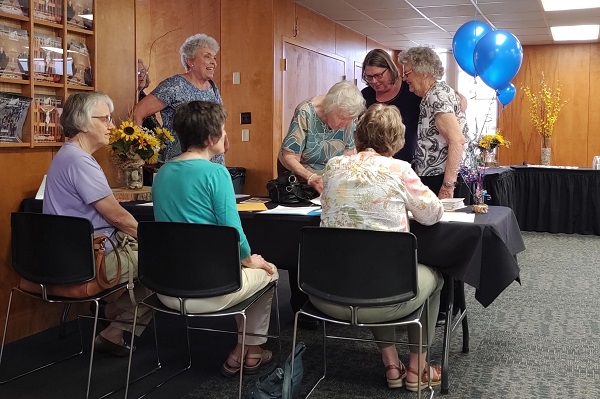
The 2019/2020 academic year marks the 174th year of our existence, but it owns another significant milestone: it is the 80th anniversary year of the Seminary Guild. Yesterday was the first monthly meeting of the academic year for the women who work so tirelessly to support our students. Formed in 1939 in response to rising food and board costs, their support has been ongoing for 80 years.
Rev. Jim Fundum, admission counselor at CTSFW and spiritual advisor to the Guild, opened the meeting with a devotion, using Scripture passages that reference 80 years. Moses came up (he was 80 when God called to him from the burning bush) as did Barzillai from 2 Samuel 19 (verse 32, “Barzillai was a very aged man, eighty years old,” began the reading, but Rev. Fundum had to stop at this point in the verse as the Seminary Guild women in their 80s had a good laugh over the description). He finished with Psalm 90:10: “The years of our life are seventy, or even by reason of strength eighty; yet their span is but toil and trouble; they are soon gone, and we fly away.”
But Psalm 90 does not end there. Verse 12: “So teach us to number our days that we may get a heart of wisdom” and at the last, in verse 17: “Let the favor of the Lord our God be upon us, and establish the work of our hands upon us; yes, establish the work of our hands!”
“That’s why you’re here, serving the Guild,” Rev. Fundum said. “He establishes the work of the Seminary Guild’s hands.”

Dr. Lawrence Rast Jr., President of CTSFW, served as yesterday’s keynote speaker. A historian first and foremost, Dr. Rast spoke of the Guild in the context of church history, particularly that of the Lutherans in America, focusing around the three major “disruptions” that rocked the Synod’s history. These are times when all seems to be in flux. “We as a church body, as a seminary, as congregations, find ourselves in situations that are unique,” Dr. Rast explained. “We experience things we have never experienced before, that threaten to derail our work.”
These disruptions are a reality of the fact that we are a member of the church militant. “’Their span is but toil and trouble,’” Dr. Rast quoted, calling back to Psalm 90.
Yet through those disruptions, through the toil and trouble, next academic year CTSFW will celebrate 175 years of existence, grown from a class of 11 students in October of 1846. The following year, our entire church body will celebrate another 175th anniversary: that of the LCMS. “That really is something,” Dr. Rast said. “One hundred and seventy-five years. God continues to bless us.”
Lutheranism in North America officially set foot on the continent 400 years ago this month. A few days into September of 1619, Lutheran Danes attempting to find a route to China got stuck in Hudson Bay. Realizing that winter would soon set in, on September 7 they decided to make camp at what is now Churchill, Manitoba; an area famous (though unknown to the 66 sailors onboard their ship at the time) for polar bears. Their Lutheran pastor, Rasmus Jensen, held the first Lutheran services on the continent. Of the 66, three men survived the winter (Rev. Jensen not among them), most dead of scurvy or lead poisoning. The survivors returned to Denmark.
Nearly 250 years later, the LCMS formed on April 26, 1847, in Chicago. At the time, there were dozens of Lutheran synods. So why begin another?
When the LCMS started in 1847 as Die Deutsche Evangelisch-Lutherische Synode von Missouri, Ohio und andern Staaten, the “Deutsche” (“German”) was inclusive, not exclusive. Germany didn’t exist and wouldn’t until 1871. German speakers hailed from across Europe, from many smaller states and regions that fall under entirely different countries now. The first-generation of Dr. Rast’s family in America spoke German and are listed in the US census as either Prussians or Russians. Though that particular geographic area is now in the middle of Poland, the family remains emphatic: “NEVER Poland,” Dr. Rast insisted, laughing.
In 1847, including all German speakers was an important part of the church’s outreach strategy. Into the early part of the 20th century, Lutherans were the most ethnically diverse denomination in America. It wasn’t just the Saxon church or the Prussian church; it was the church for all German speakers. The language was central to the Lutheran church’s identity.
However, by 1917, that became a liability: WWI had begun. The “German” in “German Lutheran” was suddenly dangerous. For example, Dr. Rast’s vicarage church, Immanuel Lutheran in Terre Haute, Indiana, originally had a school. But in 1918, the school was forcibly closed when the town grabbed the school’s only teacher and threatened to tar and feather him for, as they claimed, “Teaching the children to be German spies.” He escaped tarring and feathering, but was driven from town. Immanuel Lutheran hasn’t had a school since. In Nebraska, new state laws demanded that the German Lutherans stop teaching in German. The Lutheran church fought the law on legal grounds, taking it all the way to the Supreme Court. They won. “And then stopped using German a couple of years later,” Dr. Rast finished with a laugh.
Dr. Rast asked the women of the Seminary Guild to imagine how the transition, pressed on them by outside forces out of their control, must have felt to the founders and first generation. Their children were bilingual, many of whom favored English over their parent’s native tongue, but for that first generation of immigrants, German was their heart language.
By 1938, the LCMS had officially stopped using German as the Synod’s official language. “It was almost a non-event,” Dr. Rast said. In 1917, Die Deutsche Evangelisch-Lutherische Synode von Missouri, Ohio und andern Staaten dropped “Deutsche” from their name and thought that would be enough. It was not. In 1921, they officially adopted the English translation: “The Evangelical Lutheran Synod of Missouri, Ohio, and Other States.” Seventeen years later, at the 1938 Synod Convention in St. Louis, a delegate got up and suggested they no longer keep minutes in German.
Another delegate seconded, and that was it. “In 20 years,” Dr. Rast pointed out, “they went from a German Church to an American Church.”
The Seminary Guild came into existence in 1939, less than a year after Synod officially dropped German from their minutes and during CTSFW’s Springfield days. The Fort Wayne Seminary had already moved twice at that point, first to St. Louis in 1861 to study alongside their sister seminary (reputedly to keep their students from being drafted into the union army, “But I suspect that was just a smokescreen,” Dr. Rast added as an aside. “The frugal Germans wanted to save money. Two seminaries, one faculty.”), then to Springfield in 1875. Between the two seminaries they had run out of room and Concordia Theological Seminary decided to move to Milwaukee.
It was a practical choice: the area was filled with Lutherans and Lutheran churches, which offered plenty of fieldwork opportunities for their students. However, at almost the last moment they received an unbelievable deal in Springfield instead. The city had only one Lutheran church, but the campus and grounds were basically given to Synod. The frugal Germans were pleased. They taught seminarians in Springfield for 100 years, until Concordia Theological Seminary moved back to Fort Wayne in 1976.

The year that the Seminary Guild formed in 1939, the Wizard of Oz had premiered in Hollywood (asbestos served as the snow in the poppy field scene), the Girls Scouts sold Thin Mints for the first time (then known as Cooky Mints), and on September 1, 1939, Germany invaded Poland; Britain and France would declare war a couple of days later. The longest-serving president of the Synod had recently begun his first term in 1935 (he would remain in office until 1962), just as WWII would bring a second wave of anti-German sentiment to America.
Known as one-eyed Jack (an accident with a baseball had robbed him of an eye when he was a child), the Rev. Dr. John Behnken was the first truly bilingual president. He was American-born and preferred English. Dr. Rast’s connection with Dr. Behnken is even more personal: One-eyed Jack (then serving as a District President) introduced his grandfather to his grandmother. Dr. Behnken asked two sisters to sing a duet at the young Rev. Rast’s ordination service, then gave this sage advice to the new graduate: “Choose one.”
He chose Edith. Then, twenty years later, the former district president found a place for one of their sons at Concordia River Forest. The young music teacher met a Chicago undergraduate. “My mother,” Dr. Rast explained. “I owe Dr. Behnken my life, not just once but twice.”
With these stories always come the “What if?” What if he’d missed the train? What if he’d worked somewhere else? What if Dr. Behnken hadn’t asked two sisters to sing a duet? “You all have stories like these,” Dr. Rast said to the women of the Seminary Guild. “Stories end up fitting together, working together. The Lord has put all these pieces together.” He has done so in the small, personal matters; He has done so through the disruptions that have shaken the LCMS throughout her history; He has done so on the cross, where justice and mercy at last met one dark Friday afternoon.
Dr. Rast’s concluding point: 80 years is something to celebrate, as is the ongoing impact of the Seminary Guild to the Seminary’s mission. “It’s huge!” he declared. The Seminary Guild serves in “small” ways. They provide snacks for the students during finals week, birthday cookies for the single students, homemade t-shirts and booties for the newborns, furniture projects in student services, a book project for the new students during fieldwork assignments, and the annual donation day to support the work of the Food & Clothing Co-op. “We can’t qualify [these tasks] from this side of heaven,” Dr. Rast said. Only when we step back—and perhaps only when we finally step back into eternity—will we see how the puzzle pieces all fit together, according to God’s good will and purpose and promises.

From 1932-1962, the LCMS doubled in size from one to two million. This is not the trend we see today; we too are living through significant disruption as the world howls in hostility at the inerrant Word of God. “We remember the really good days, always,” Dr. Rast said. But the reality is that the golden years were probably not as golden as we imagine. “Don’t pine for a past that probably never was.”
Instead, we are simply called to be faithful. And so we pray Psalm 90, the only psalm attributed to Moses, a man of God whose life began, in many ways, at 80:
Lord, you have been our dwelling place
in all generations.
Before the mountains were brought forth,
or ever you had formed the earth and the world,
from everlasting to everlasting you are God.
You return man to dust
and say, “Return, O children of man!”
For a thousand years in your sight
are but as yesterday when it is past,
or as a watch in the night.
You sweep them away as with a flood; they are like a dream,
like grass that is renewed in the morning:
in the morning it flourishes and is renewed;
in the evening it fades and withers.
For we are brought to an end by your anger;
by your wrath we are dismayed.
You have set our iniquities before you,
our secret sins in the light of your presence.
For all our days pass away under your wrath;
we bring our years to an end like a sigh.
The years of our life are seventy,
or even by reason of strength eighty;
yet their span is but toil and trouble;
they are soon gone, and we fly away.
Who considers the power of your anger,
and your wrath according to the fear of you?
So teach us to number our days
that we may get a heart of wisdom.
Return, O Lord! How long?
Have pity on your servants!
Satisfy us in the morning with your steadfast love,
that we may rejoice and be glad all our days.
Make us glad for as many days as you have afflicted us,
and for as many years as we have seen evil.
Let your work be shown to your servants,
and your glorious power to their children.
Let the favor of the Lord our God be upon us,
and establish the work of our hands upon us;
yes, establish the work of our hands!
